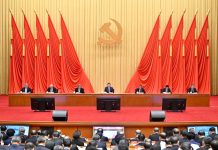BEIJING: Businesses are welcoming a return to stability in the Australia-China relationship, with three out of four foreign firms ranking China among their top three global investment destinations over the next three years, according to a report based on a survey by the China-Australia Chamber of Commerce (AustCham China) that was provided to the Global Times on Friday.
The survey collected insights from 858 Chinese and foreign companies active across the China-Australia business corridor, and the results pointed to China’s enduring commercial appeal and the major opportunities in resources, agribusiness, and green supply chains, including clean energy technologies, electric vehicles, and critical minerals.
In 2024, over 75 percent of the foreign firms reported profitability – up from 58 percent in 2023 – and 51 percent recorded year-on-year revenue growth. These results underscore China’s continued economic scale, its leadership in innovation, and its critical role as a hub for globally competitive, future-focused industries, the report said.
Some 86 percent of respondents expressed positive sentiment about bilateral ties, and 76 percent said the improved relations have shaped their long-term China strategies, the report said.
The economic connectivity between China and Australia is unique, primarily because the two economies are highly complementary, Chen Hong, director of the Australian Studies Centre of East China Normal University, told the Global Times on Friday.
He noted that history has shown that at various times, especially amid today’s changing global landscape, the bilateral relationship has demonstrated strong resilience.
“Despite political differences on certain issues, the momentum of economic cooperation between the two countries has never been truly hindered. What we are witnessing now is a high level of economic integration, which reflects the vitality and importance of bilateral cooperation,” Chen added.
The report highlights strong alignment between foreign and Chinese firms in sectors that are shaping future trade and investment, while traditional strengths like resources and agribusiness continue to underpin the Australia-China commercial relationship.
The data also points to a more mature phase in bilateral engagement, with clean energy technologies, biopharmaceuticals, and medical devices gaining momentum as future growth areas.
Electric vehicles (EVs) and clean energy technologies were identified as key export opportunities for Australia, reflecting China’s global leadership and strong manufacturing capabilities in these areas.
Respondents said agribusiness and food and beverages would also offer strong opportunities for Australian investment in China over the next five years.
Clean energy stands out as a truly shared priority – it was identified by both foreign and Chinese firms as a top sector for two-way trade, investment, and strategic collaboration. This convergence reflects a shift from transactional exchanges to deeper partnerships built around innovation and joint value creation, according to the report.
“China’s continued market opening offers more development opportunities for Australian businesses, while Australian products also help to diversify supply for the consumer market in China,” Chen said.
When asked whether the Chinese Foreign Ministry could confirm a report by the South China Morning Post that Australian Prime Minister Anthony Albanese will visit China this summer, Foreign Ministry spokesperson Lin Jian said at a regular press conference on Thursday that he was unable to comment.
But he added that China’s position on developing its relations with Australia is consistent and clear. China stands ready to enhance exchanges and cooperation with Australia and work for a more mature, stable and productive comprehensive strategic partnership, Lin noted. –The Daily Mail-Global Times news exchange item






